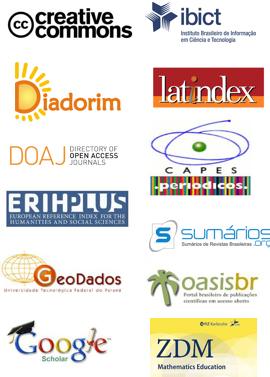Vivências Culturais e Educação Matemática: Um Estudo na Escola Quilombola Tereza Conceição Arruda
DOI:
https://doi.org/10.17921/2176-5634.2024v17n3p296-307Resumo
O estudo da matemática vai muito além das quatros operações básicas, entre tantos conhecimentos produzidos, há também um modo de aprendizagem que parte do saber para o fazer. Assim, esta pesquisa teve como objetivo geral compreender como professores da Escola Estadual Quilombola Tereza Conceição Arruda, se apropriam dos conhecimentos matemáticos a partir das vivências do contexto cultural e articulam os diferentes saberes e fazeres Quilombolas com a comunidade escolar. Trata-se de uma pesquisa de abordagem qualitativa, na qual os dados foram coletados por entrevistas. Os participantes deste estudo foram professores que lecionam a disciplina da Parte Diversificada - Ciências e Saberes Quilombolas. Com os resultados analisados foi possível perceber que os professores, participantes da pesquisa, tem a percepção dos conhecimentos matemáticos informais, espontâneos, condizentes daquela cultura, sem registros, mas sim na oralidade, a matemática da família ou dos seus ancestrais que atravessam de geração a geração, haja visto que, esta comunidade possui diversas potencialidades pedagógicas a serem desenvolvidas na aprendizagem matemática e trazer o olhar dos docentes junto à comunidade nessa conexão de saberes e fazeres, a valorização, fortalecimento e salvaguardar todos os conhecimentos advindo da cultura Afro-brasileira, Africana e Indígena, entrelaçados as disciplinas da Parte Diversificada nomeadas de Ciências e Saberes Quilombolas.
Palavras-chave: Ciência. Ensino e Aprendizagem. Educação Escolar. Etnomatemática.
Abstract
The study of mathematics goes far beyond the four basic operations; among the many knowledge produced, there is also a learning approach that moves from knowing to doing. Thus, this research aimed to understand how teachers from the Quilombola State School Tereza Conceição Arruda appropriate mathematical knowledge based on the experiences of the cultural context and articulate the different Quilombola knowledge and practices with the school community. This is a qualitative research in which data were collected through interviews. The participants in this study were teachers who teach the subject of the Diversified Part – Quilombola Sciences and Knowledge. The analyzed results showed that the teachers involved in the research have a perception of informal, spontaneous mathematical knowledge, consistent with that culture, without formal records, but transmitted orally—family mathematics or ancestral knowledge passed down from generation to generation. This community has various pedagogical potentials to be developed in mathematics learning, bringing the teachers' perspective together with the community in this connection of knowledge and practices, valuing, strengthening, and safeguarding all knowledge coming from Afro-Brazilian, African, and Indigenous cultures, intertwined with the disciplines of the Diversified Part called Quilombola Sciences and Knowledge.
Keywords: Science. Teaching and Learning. School Education. Ethnomathematics.


